
|
A Simple Plan (1998)
In director Sam Raimi's neo-noirish, dramatic and violent
crime-thriller, first-time scriptwriter Scott B. Smith adapted
his own compelling and grim 1993 thriller novel (a
NY Times best-seller) for which he was nominated for Best Adapted
Screenplay (losing to Bill Condon's Gods and Monsters (1998)).
The film's only other Oscar nomination was for Best
Supporting Actor (Billy Bob Thornton) who lost to
James Coburn in Affliction (1998).
The story told about the fortunes
(and misfortunes) of a trio of rural, blue-collar Midwesterners who
happened to find millions of dollars in cash, and then concocted
"a simple plan" to abscond with the money - before everything began
to inevitably unravel. As with all tales of this kind, greed, mistrust,
unpredictable complications, paranoia, deceitfulness, and both stupid
and deadly mistakes doomed the small-town residents to seek irreversible,
desperate and failing measures.
The suspenseful, cautionary film with slowly-escalating
tensions portrayed the dark side of corruptible human nature of the
three richly-displayed characters, also exemplified by the bleak
and grayish winter skies (shot mostly on location in Minnesota, with
a low-key black and white color scheme). The discontentedness and
moral compromises made by the basically-decent but corrupted principal
characters were also described in the film's taglines:
- "Sometimes good people do evil things."
- "Four million
dollars and plenty of change."
- "They've worked hard all their
lives, but they still can't afford the American Dream. Stealing it is even better."
Its main tragic Shakespearean plot ("money (and/or
greed) is the root of all evil") was considered to be a reworking
of one of Geoffrey Chaucer's Canterbury Tales ("The
Pardoner's Tale"), and also loosely based
on the well-known fable: "The Three Thieves and a Purse of Gold."
Other films echoing the film's message about how wealth corrupts
included John Huston's The Treasure of the
Sierra Madre (1948), Danny Boyle's Shallow Grave (1994), and
one of the last lines
of dialogue in the Coen Brothers' similar film Fargo
(1996): "And for what? For a little bit of money? There's
more to life than a little money, you know."
On a total budget of $30 million, the film made only
$16.3 million in gross revenues, due to its limited release. Danny
Elfman's haunting music compositions (with flutes, zithers, hand-drums,
banjos, and pianos) and superb cinematography by Alar Kivilo made
the absorbing film extremely memorable.
- before the opening title credits, there was a close-up
view (filling the screen) of an ominous black crow on a tree branch
surveying a wintry landscape; during the titles,
a crafty red fox stalked a chicken coop for its next meal
- on New Years' Eve in a small rural
town in Wright County, Minnesota, humble and sensible, calm, measured
and well-educated feed-mill accountant Hank Mitchell (Bill Paxton),
an employee at the Delano Feed and Grain Mill, reminisced (in voice-over)
about the ingredients for a a happy life:
- "When I was still just a kid, I remember my father
telling me what he thought that it took for a man to be happy....Simple
things, really. A wife he loves, a decent job, friends and neighbors
who like and respect him. And for a while there, without hardly
even realizing it, I had all that. I was a happy man"
- after leaving work early due to the holiday, Hank
walked home to his modest house in the neighborhood, where he was
greeted by his very-pregnant wife Sarah Mitchell (Bridget Fonda),
who worked in the town's library
- in the afternoon, he joined
his older brother Jacob Mitchell (Billy Bob Thornton) and Jacob's
often-drunk friend Lou Chambers (Brent Briscoe) who drove up in
Jacob's 1971 Chevrolet C-20 red pickup truck; the slow-witted,
near-sighted, dopey-looking, lonely and morose, ineligible bachelor
and sad-sack Jacob was buck-toothed (with an overbite) who held
the bridge of his glasses together with duct tape; in the back
of the truck was Jacob's golden retriever Mary Beth
- the group drove out to visit
the town's cemetery to put poinsettias on the grave of the two brothers'
deceased father; Jacob was distracted by Lou writing his name in
the snow while urinating, and ran off to join him
- as they drove back toward town, the red fox - now
with a hen in its mouth - crossed their path, causing Jacob to
swerve his truck to avoid it; he crashed into a tree and
as a result of the accident, Mary Beth ran off into the woods
to chase the fox into a nature preserve; the threesome set off
to find the fox, as both Jacob (with his hunting gun) and Lou
foreshadowed what they would find: "We're collecting
the dead"; while traversing through the snow, they noticed
black crows gathered above them - Jacob remarked about the nature
of the scavengers: "Those things are always waitin' on something
to die so they can eat it, right? What a weird job"
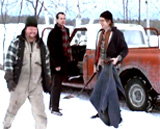
|
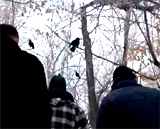
|
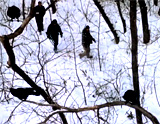
|
|
After Truck Crash, the Threesome Set Off Into the
Woods, Beneath Observant Crows
|
- Jacob borrowed a beer from Lou, and as he drank
it, he imitated lawyer George Hanson's (Jack Nicholson) quirky
drinking routine of flapping one arm like a chicken while saying
"nic-nic-nic" ("Wonk! Dit-dit") in Easy
Rider (1969); Lou haphazardly threw a snowball that uncovered
a small, crashed plane in the snowbound woods; they had stumbled
upon an unreported crash site; inside the wreckage after pulling
open the plane's side door, Hank viewed the dead pilot (Terry Hempleman)
in the cockpit having his face pecked at by crows, followed by
an attack that wounded him with a gash in his forehead (resembling
the bird attacks in Hitchcock's The
Birds (1963))
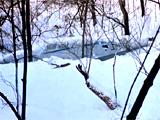
Crashed Plane Discovered in a Snow Bank
|
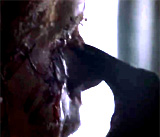
Dead Pilot (Terry Hempleman) Pecked at by a Crow
|
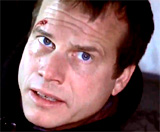
Hank With Gash in Forehead After Crow Attack
|
- a large black duffel-gym bag was dragged from the
belly of the plane, and inside were hundreds of wrapped $100 dollar
bills; Lou and Jacob surmised that it was "drug money"
and that the pilot was a "dope dealer" with "dirty money"
(Jacob: "I saw it on 20/20"); Hank suggested
that it was a "police matter" and that they should immediately
turn in the money; however, the tempted, broke and destitute Lou
and Jacob preferred to keep the money, but Hank continued to have
moral qualms: ("You want to keep it?"): he argued that
it would be regarded as stealing, and they'd inevitably end up
caught and would go to prison; Lou disagreed: "Nobody knows
about this, but us"; Jacob added: "It's like we came
out here just on a hike, And found lost treasure. Right?",
and Lou concurred: "It's the American
dream in a god-damn gym bag, and he just wants to walk away from
it!"
- Hank continued to debate with them about the proper
thing to do: "You work for the American dream. You don't steal
it"; Lou argued: "Then this is even better," and he attempted to
convince Hank to see the money as an easy opportunity to advance
in life: "You got a beautiful wife at home. You're about to have
a baby. I know you ain't pullin' down that much at the feed mill.
Wouldn't you love to have a piece of this?"; the two were able
to easily convince Hank to at least keep the money for themselves
for awhile, hidden away until they could confirm one way or the
other if anyone was looking for it: ("Hank, why, why turn it in
until we know whether or not somebody's lookin' for it?")
- ultimately, Hank was persuaded by the others to
keep the money, but only under his firm conditions: "Suppose
I was the one to keep it?...Just till spring, till they find the
plane....Then, if you're right and nobody mentions the money, we
split it up, and we all leave town...That's the only way I'll do
it. Otherwise, we can just turn it in right now"; he forced
them to agree to his demanding terms - that he would be in charge
of the money until the springtime thaw when the plane would undoubtedly
be found; at that point, they could see whether anyone claimed
the money; if not, they could divide up the money into equal shares
amongst themselves, and leave town
- the three chuckled as they began to count the
bundles of $100 dollar bills back at the truck as it turned dark;
the haul amounted to $4.4 million dollars; they
were interrupted by the arrival of Sheriff Carl Jenkins (Chelcie
Ross), who pulled up after noticing Jacob's truck by the side of
the road; as Hank innocently chatted with the Sheriff, Jacob and
Lou sat in the truck; when the Sheriff was about to leave, Jacob
walked back to greet the Sheriff and foolishly asked Hank:
"Did you tell him about the plane? It sou-sounded like a plane";
Hank was able to deflect the question: ("Uh, I don't know
what he heard. You know he's always hearing s--t"), and he
escaped further inquiries, temporarily
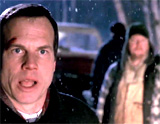
Arrival of Sheriff Carl Jenkins (Chelcie Ross) at
the Truck
|
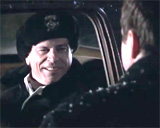
The Sheriff Innocently Chatting with Hank
|
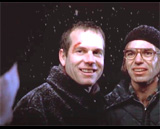
Jacob's Foolish Question to Hank - in the Sheriff's Presence ("Did
you tell him about the plane?")
|
- on the way back into town, Hank was exasperated
by the stupidity of Jacob's question and threatened to destroy
the money: "You want me to burn the money?! I am not going
to prison over this! If it looks like there's even the slightest
chance of us getting caught, I swear to God, it's all gonna vanish!
Do you understand?"; as they dropped Lou off at his home,
Hank was worried that Lou could keep their "secret" from his wife
Nancy Chambers (Becky Ann Baker)
- only moments after returning home, Hank
asked his wife Sarah a hypothetical question that hinted at
what had happened: "What if you were walking in the woods...and
you found a bag full of money, Let's say $4 million. Would you
keep it?"; she answered that it would be stealing if it was "lost
money" or someone else's money: "But I wouldn't take
it. That's just me. I wouldn't"; after dumping the money onto
a table from the duffel bag, Hank now tried to persuade Sarah that
it was completely reasonable to keep the money: "If we keep
it, we never have to worry about money again....nobody gets hurt
by us keeping it. I mean, that's what makes it a crime, doesn't
it, somebody getting hurt?"; she reminded him that it was
still "against the law" and would send him to jail if caught; Hank described the pact he had
made with his buddies: "We sit on it, we see what happens.
If somebody comes searching for it, then we just burn it and that
will be that. There's no risk. We'll always be in control...It
seems crazy just to give it up. I mean, before we know if anybody's
searching for it"
- later after watching the Times Square
ball drop on TV, in the middle of the night, Sarah awoke in bed
and began scheming; she deviously proposed for Hank to hide their
guilt - by replacing some of the money back in the downed plane
without telling either Jacob or Lou: "You have to go back and return
some of the money...a lot, like $500,000. You see, that way when
they find the plane, they'll assume nobody's been there yet. It'll
put us beyond suspicion...We have to be careful. We have to be
thinking ahead all the time"
- the next day, Hank asked
Jacob to accompany him to the crash site and function as a "lookout"
(to provide a decoy by pretending to change
a flat tire on Hank's 1966 Volvo station wagon); meanwhile, Hank
would return to the plane and replace some of the money to avoid
suspicion, although he told Jacob that all he was doing was re-positioning
the pilot: ("I moved the pilot. Come on, we gotta go put him back like he was")
- while Hank was at the plane, elderly neighboring
farmer Dwight Stephanson (Tom Carey) appeared on his snowmobile;
when he proposed to Jacob that they search in the woods (near the
plane) for the pesky fox, Jacob panicked and bludgeoned Dwight
with a crowbar; Hank returned, and believing that Dwight was dead,
he felt he must protect his dim-witted brother; Hank proposed to
drive Dwight's body on the snowmobile into a nearby park
to hide his body, and would then reconnect with Jacob
- after Jacob drove off, to Hank's surprise, Dwight
revived - and suggested calling the police to report Jacob's assault;
to silence him, Hank suffocated Dwight to death and then created
a fake accident scene by steering the snowmobile (with Dwight in
the driver's seat) off a bridge embankment; Jacob arrived to pick
up Hank on the bridge over Anders Creek, and forcefully wanted
to confess to everything: "We're just gonna tell everybody the truth. Just gonna tell
'em about the money and everything," but Hank dissuaded him;
Hank shocked Jacob by admitting to the murder: "You didn't kill
him...He was alive when you left. I smothered him. I guess that makes
it my decision"
- once Hank returned home, he told Sarah that he hoped
that evidence of their tracks near the woods and the plane, or
any blood stains in the snow, would be covered up by a new snowfall;
they watched a TV news report about the snowmobile crash; Sarah
worried: "I wish you hadn't told Jacob. I wish he still thought that he did
it....it scares me. What if he tells somebody?"; she calmly
reasoned that Hank felt "trapped" and had no other alternative
but to murder Stephanson
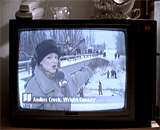
TV News Report About the Crash
|
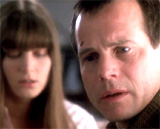
The Worried Couple: Hank with Sarah
|
- Hank was saddled with nagging regrets and guilt
over the murder of the farmer, and continued worries about Jacob's
tendency to foul things up; during his next work-day's lunch break,
Hank met with Jacob at the family farm, who made the surprise announcement
that he planned to remain in town after springtime to rebuild
their dream homestead: ("I'm gonna buy it back. I'm gonna
fix it up. I'm gonna rebuild it just like it was before mom and
dad died"); Jacob's change of plans went against the group's pact to split
up the money and then immediately leave town, because townsfolk
wouldn't understand their newfound wealth; Hank also argued that
Jacob was woefully unprepared to be a farmer: ("You gotta
work it. You gotta know about machinery and seed....Fertilizers,
pesticides, herbicides, Drainage, irrigation, the weather? Come
on, you don't know about any of that stuff. You're gonna end up just like dad")
- during their conversation, Jacob's old resentments
resurfaced against Hank; Jacob ignored the fact that their father
was a "bad businessman" who let the farm deteriorate, and instead
blamed their father's mortgage debts on Hank's expensive 4 years
of college education; ideally, Jacob felt entitled that he should
be the one to restore the farm: ("I'm supposed to get the farm....This
is what I want. This is, this is where I wanna be. It's my home, Hank")
|
Sarah's Research About a Related Abduction and Ransom
Money
|
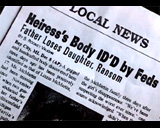
Report of a Dead Abducted Heiress, With a $4.4 Million
Dollar Ransom
|
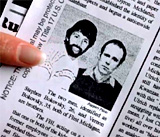
|
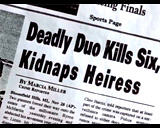
|
|
The Two Gunmen-Kidnappers ("Deadly Duo")
- the Bokovsky Brothers, Stephen and Vernon From Flint, MI
|
- Hank stopped off at the town's library, where Sarah
revealed research about a $4.4 million dollar ransom for a 17 year-old
wealthy heiress (Lizzie McMartin), the daughter of millionaire
and paper cup manufacturer Byron McMartin; she had been kidnapped
by two Bokovsky brothers (Stephen - 26, and Vernon - 35) in Bloomfield
Hills, MI in late November; a few weeks later, she was found murdered
and dumped in a lake; the kidnapping incident resulted in six dead;
Hank realized everything now changed: "This
changes it...We can't say it isn't stealing anymore...We thought
it was drug money. We thought it was money that we could find";
Sarah was more relieved that the ransom money was paid in unmarked
bills, and it wasn't counterfeit or marked ("This is good!")
[Note: By film's end, this was proven to be untrue.]
- in the middle of the night, during a full moon,
Hank was awakened by noises from outside; a drunken Lou was at
his front door, playfully calling out "Mr. Accountant" and
demanding "a tiny withdrawal" - i.e., one of the wrapped
packets of $100s; he claimed: "I want my share...part of that
is my money"; Hank reminded Lou that the deal was to wait
and decide whether the money was safe to keep, and again threatened
to burn the money; Lou threateningly alluded to how he might squeal
to Sheriff Carl Jenkins if his demands weren't met, since he had
learned a "little secret" from Jacob about Dwight's murder;
Hank tried to reason with Lou: ("We're
all in this together. If one of us goes to jail, we all do"),
but Lou argued that he had recklessly overspent and was broke:
("I need my share, Hank!"); Hank lied about how the money
was a "day's drive" away - stashed for safety's sake in a storage locker
above the interstate, and gave Lou $40 of his own money
- shortly later, Sarah gave birth to a baby girl (Amanda),
and Jacob paid a visit to the hospital with a gift (of his own
childhood's stuffed bear); after learning from Jacob that Lou had
lost money gambling at a casino, Hank confronted Jacob about telling
Lou the truth behind Dwight's death: ("How could you have
told him that, huh?"); Hank demanded to know why he had been
betrayed and why Jacob was taking "sides"; he insisted
that Jacob reaffirm his loyalty to him: ("I wanna know, me
or Lou?") - Jacob vowed to never betray his brother Hank: ("I'd pick you. You're my
brother")
- moments later in the hospital while breast-feeding
her baby, the ever-scheming Sarah strongly suggested that Hank
buy a small tape recorder to frame the troublesome Lou by having
him jokingly confess to a killing; Hank was instructed to "tape
Lou confessing to Stephanson's murder" after
getting him drunk; the avaricious Sarah was extremely persuasive
in trying to eliminate Lou from acquiring his share of the ransom
money, by getting him to reveal compromising information: "We
should at least try, shouldn't we? We can't lose anything by trying,
right?"
- during a private conversation, Hank tried to be
supportive of Jacob by coyly suggesting that he would help him
buy back the family farm, but then bargained that he had to exchange
the favor; he stressed that Lou was a terrible risk to both of
them: ("He can put us both in jail, Jacob...I can't afford
to go to prison, Jacob"); he urged that Jacob should help
him to trick and coax Lou to join them for a night of drinking
for their nefarious plans; (offscreen) Jacob phoned Lou and arranged
for the gathering
- unannounced, Hank invited Jacob over for dinner;
Sarah was a bit taken aback by Jacob's presence - the couple was
very on-edge and worried about how prone Jacob was to making mistakes:
(Sarah: "If he stays, we get caught...It's just a matter of time
before he screws up"); during dinner conversation, although Hank
appeared clueless about their father's
failings, Jacob revealed his clear insightfulness that their very
desperate, indebted father had purposely committed suicide in order
to provide insurance money to take care of the family: "Hank, Dad
killed himself, you know that?...They were drunk, they had a wreck...He
figured that, you know, all that insurance money...it'd take care
of the whole deal..."; Hank was stunned by the revelation; Jacob's
insinuation was that their father wouldn't have killed himself
if he had the money that they had found
- later that night, after drinking heavily in the
town's tavern, the threesome returned to Lou's home, where Jacob
foolishly convinced Lou that Hank would rat out the two of them:
(Lou: "I bet you would rat on us just to get off the hook, now, wouldn't
ya?"); then, Jacob proposed doing more play-acting, and Lou was successfully
tricked into vowing to the Sheriff that he had murdered Dwight: ("It's
about Dwight Stephanson....He didn't die in an accident... No,
no, I killed him....I suffocated him with his own scarf, and then
I just shoved him off the bridge into Anders Creek. I made it look
like an accident"); Hank had switched on the recorder to capture
his confession, and then held up the recorder and played back Lou's
incriminating words; Lou was confused and asked quizzically: "You
taped this?...Why would you do that, Hank?"
- Hank described how the Sheriff would react if both
of them entered his office with counter-accusations - the Sheriff
would surely believe employed, college-educated Hank over the alcoholic
redneck Lou - ("a 40-year-old unemployed high school dropout
who's proud when people call him the town drunk"); when
Lou realized he was being set up and conspired against by BOTH
of them in order to even the odds and keep him from being a blackmailer,
he angrily grabbed his Winchester shot-gun and threatened Hank
to give him the tape; Jacob raced outside to his truck for his
hunting rifle and then - to save his brother, he nervously shot
Lou dead in the doorway
- with all the commotion and gunshot, Lou's wife Nancy
appeared from upstairs and witnessed the dispute - she saw her
dead husband on the living room floor and grappled with Hank; she
noticed Lou's shotgun on the floor and grabbed it; after Hank wrestled
the shotgun from her, she raced into the kitchen, seized her Smith & Wesson
hand-gun, and began firing wildly at Hank; he retaliated with Lou's
shotgun in his hands and shot her dead; before the police arrived,
Hank suggested exculpatory testimony for Jacob to practice and
describe, in order to clear them of any wrong-doing
- after police questioning by Sheriff Jenkins of Hank
and Jacob (separately), the authorities were convinced
by the bloody evidence that a domestic quarrel between the Chambers
couple had ended with the crazed and drunken Lou shot-gunning his
wife (holding a pistol) to death in the kitchen, after which Jacob
outside at his truck was forced to kill Lou to save Hank's life
in an act of self-defense
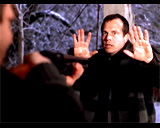
Lou Threatening to Kill Hank on His Front Porch
|
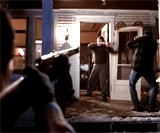
Rifle-Shotgun Stand-Off Between Jacob and Lou
|
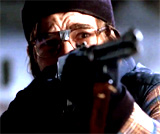
Jacob About to Fire at Lou to Save and Defend Hank
|
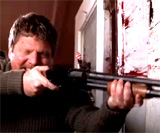
Lou's Blood Splatter After Jacob Shot Him
|
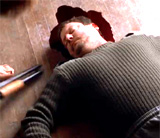
Lou Dead on His Living Room Floor
|
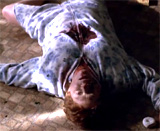
Nancy Dead on Her Kitchen Floor
|
- a brief funeral ceremony was held at the church
and cemetery; Jacob remained morose over the death of his friend
Lou; after Jacob was heavily drinking by himself in a bar, Sheriff
Jenkins found him sitting passed out in an armchair in Lou's
house; the Sheriff felt obligated to bring him over to Hank's place
for observation; Jacob confided to Hank about how he felt "evil"
- in the next sequence
during a trip with Hank to retrieve his truck parked outside Lou's
house, Jacob was hopeful - in a heartfelt dialogue - that the
money could help set his life straight: "You know, maybe I
can get a family of my own now. I mean, with the money and all....Don't
you think somebody would marry me If I'm rich?"; he admitted
that the only girl, Carrie Richards, who went steady with him for
a month, was paid $100 by her friends; Jacob revealed his utter
loneliness: "God, Hank, you know, I've never - I've never even kissed
a girl before. And you know what? If being rich will change that,
I'm all for it. I don't care. I just wanna feel it, you know? I
just wanna know what people do, you know? I don't care if it's
'cause of the money"; he was hopeful that he could be happy
by buying back the family farm, by meeting a nice girl ("a
normal woman"), having lots of kids, and sitting around and telling stories on the porch
- in town, the Sheriff asked for assistance the following
afternoon at 3 pm from Hank (with Jacob) to aid an FBI agent: "Seems
they're looking for a lost plane"; in the meantime, tensions flared
with Hank's wife when he suggested that she leave and flee with
the money and the baby; he was frazzled: "It wouldn't be that hard
for somebody to just put it all together. There's the plane and,
and Stephanson. There's Lou and Nancy"; Sarah reassured Hank -
"You're just a normal guy, A nice, sweet, normal guy....Nobody
would ever believe that you'd be capable of doing what you've done"
- during a brief interview in the Sheriff's office
while FBI agent Neil Baxter (Gary Cole) took notes, Hank and
Jacob claimed they heard a noise (from either a plane or a snowmobile),
but no crash; as they left, the agent requested a trip out to the
nature preserve: "Do you think you could take us out there?";
the agent cryptically added: "Lookin' for a plane"
- once Hank returned home, Sarah grew skeptical that
nothing made sense, and speculated that the FBI agent was an imposter
- in fact, from her research, she asked Hank if one of the two
kidnapping brothers pictured in her researched newspaper articles resembled the "agent" he
had spoken with; she worried that if Hank, Jacob and the Sheriff
led the agent into the woods, they would be executed: "He's gonna
shoot all three of you, Hank...so he can get rid of the witnesses";
in one of the key dialogues in the film, Sarah proposed another
"plan" to try and avoid having Hank shot, but he became exasperated
with her disastrous plans:
- "A plan? Like the one to
take the money back to the plane, and we end up killing Stephanson?
Or maybe the one where we tape Lou, and two more people end up
dead. Is that the sort of plan you're thinkin' of?"
- Hank vowed to end everything by returning the money:
"I'm takin' the money back right now, all of it....I'm gonna
put it back, and everything's gonna be just like it used to be"
- but Sarah would have none of it; in an impassioned and ranting
speech, she manipulatively urged them to keep the money to better
their meager domestic lives:
- "Is that what you think you want? Walking off to the feed store every
morning for the next 30 years, waiting for Tom Butler to retire
or die so you can finally get a raise? And what about Amanda?
Do you think she's gonna like growing up in somebody else's
hand-me-down clothes? Playing with some kid's old toys because
we can never afford to buy her anything new?... And me. What
about me? Spending the rest of my life, 8 hours a day, with
a fake smile plastered on my face checking out books, and then
coming home to cook dinner for you. The same meals over and
over again, whatever the week's coupons will allow, only going
out to restaurants for special occasions, birthdays or anniversaries.
And even then having to watch what we order, skipping the appetizer,
coming home for dessert. You think that's gonna make me happy?"
- Sarah also suggested that without the money, Jacob
would have to go back to the "welfare office" for support,
but would probably die prematurely due to the loss of his good
buddy Lou; she ended her speech with caustic sarcasm: "Sounds
wonderful, doesn't it? Everything just like it used to be"
- the next morning, Sarah phoned the FBI office and
discovered that there was no "Neil Baxter" working there; she quickly
relayed the information to Hank to alert and warn him: ("It's him,
Hank. Come home. You gotta get out of there...He's gonna shoot
you both"); Hank felt obligated and pressured to remain with the
Sheriff, but in order to defend himself, he stole a revolver (and
ammo) from the Sheriff's locked gun cabinet and desk in the office before
the threesome headed out to the woods and nature preserve to
search for a plane; as they arrived, Jacob pulled up in his truck
to aid in the search; he mentioned he had spoken to Sarah, and
felt better after a night of heavy drinking
- the Sheriff suggested a strategy of splitting up
to efficiently cover more territory; although Hank located the plane
first, he didn't report his finding; as he moved away from the
plane, he and the others were alerted by the Sheriff with a gun-blast
that he had located the plane; Hank attempted to shout out and
warn the Sheriff that FBI agent Baxter was an imposter: ("Make
him show you his badge....He's got a gun! He's not FBI. He's lying");
Baxter came up behind the Sheriff and shot him dead; at gunpoint,
Baxter demanded from Hank: "Where's my money?"; he grabbed
Hank and ordered him to retrieve his money from inside the plane;
after crawling into the plane, in a tense sequence, Hank struggled
to load bullets into his gun, and then claimed he had found the
bag of money; outside the plane, Hank held his gun on Baxter who
was taken aback: "So you had a piece, huh? But you're not
the cold-blooded type, are you, Mr. Mitchell? Looks like we're
both gonna have an awful lot of explaining to do"; Hank quipped: "Just
me" - before
shooting him point-blank in the head
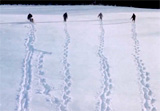
Foursome Search in the Nature Preserve
|
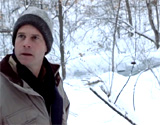
Hank Found the Plane First
|
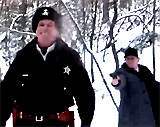
Sheriff Shot Dead From Behind by "FBI Agent" Baxter
|
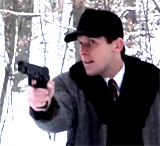
Baxter to Hank: "Where's my money?"
|
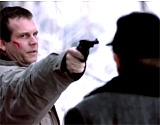
Hank's Point-Blank Murder of Baxter
|
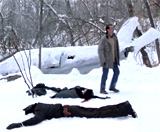
Hank with Two Bodies at the Plane
|
- Hank struggled to convince Jacob that they had to
develop another story to tell the authorities: ("You understand
what we gotta say?"), but Jacob was sickened by the continued lies
and didn't believe that they could talk their way out of avoiding
prosecution: ("We can't do this, Hank...We're gonna have to
tell on ourselves"); Hank felt otherwise: "Yeah, it's gonna work. It's perfect.
We just gotta get through the next couple of hours, And then we're
home. We're home-free"; the two both disagreed about how to
proceed - should they create another concocted tale, or tell the
truth and end up in jail?
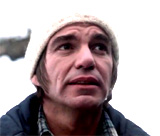
|

|
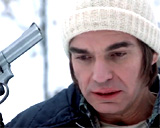
|
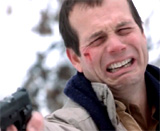
|
|
Jacob Offered to Commit a Self-Sacrificial Suicide
- Hank Fulfilled Jacob's Request and Shot His Brother Dead
|
- Jacob simply stated: "I wish somebody else had found
that money"; he also claimed that he
couldn't live with all the guilt, deceptions and bad memories: "I
don't wanna sit around the rest of my life thinking about this
s--t. I can't do it, sit on the porch and drink. I can't do it,
so you're gonna have to do it"; Hank kept trying to convince him:
"Couple more hours, we'll be home"; Jacob realized that his life
wasn't worth living anymore, when he compared it to his brother
Hank: "You can do this, and it's gonna be perfect for you. And
you got something, you got something to go on for, Hank, and you know it"
- the beaten-down Jacob was hinting that he wanted
to end his lonely, poor and miserable life - by committing suicide
- it would be a perfect ending for Jacob, just like their father's
sacrifice: "I don't wanna be here...Come on, Hank. Let me do something";
he threatened that if Hank wouldn't sacrifice him, then he would
have to kill himself: ("But if you don't do it, then I'm gonna
do it, and then we're gonna both gonna be f--ked, aren't we? We
don't need to both be f--ked. I'll-I'll do it, Hank, if you don't,
I'm telling you I will"); as Jacob put a gun to his head,
Hank yelled out for Jacob to stop, and then used Baxter's gun to
shoot and kill Jacob - it would be the most believable alibi to
have "bad guy" Baxter charged with both murders: "Make it look
like the bad guy did it, Hank" [Note: This mercy killing was reminiscent
of the conclusion of Of Mice and Men.]
- afterwards, during an informational session with
two authentic FBI agents Renkins (Bob Davis) and Freemont (Peter
Syvertsen), Hank was told that the imposter agent was actually
Vernon Bokovsky, and that his brother was the dead pilot; as Sarah
had discovered, they had demanded a ransom of $4.4 million after
kidnapping and killing their female hostage, who they shot and
dumped in a lake; the agents also revealed that about 10% of the
ransom bills' serial numbers were recorded (not marked), so it
would be impossible to know which bills could be tracked down if
spent: ("Now it's simply a matter
of waiting for the numbers to turn up"); Hank realized that
he would eventually be caught if he began to spend the money
- upon his return home, Hank dumped out the contents
of the duffel bag in his living room, and began to burn the money
in their fireplace, as Sarah protested and begged for him to reconsider: "Hank,
we can run with it. We could leave the country. We could go to
South America or to Australia or someplace far away"; he pushed her away
- in the book-ended conclusion, Hank was in deep reflection
almost every day - with a narrated voice-over - about his constantly-haunting
memories: "There are days when I manage not to think of anything
at all. Not the money, or the murders, or Jacob. Days when Sarah
and I try to pretend that we're just like everyone else, as if
none of it had ever happened, but those days are few and far between";
Hank stood outside the family farm that Jacob had wanted to rebuild,
with major regrets about what could have been
- [Note: Body Count: (1) Farmer Dwight Stephanson
- suffocated by Hank, (2) Lou Chambers - shot by Jacob, (3) Nancy
Chambers - shot by Hank, (4) Sheriff Jenkins - shot by fake agent
Baxter, (5) Baxter - shot by Hank, (6) Jacob - shot by Hank; four
of the film's six murders were committed by Hank.]
|
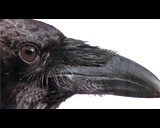
Close-Up of Crow in Wintry Landscape During Film's Opening Credits
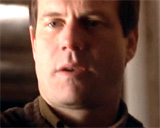
Feed Mill Accountant Hank Mitchell (Bill Paxton)
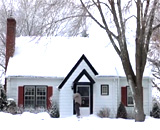
Family Man Hank's Modest Home in Town
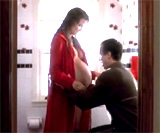
Hank's Very Pregnant Wife Sarah (Bridget Fonda)
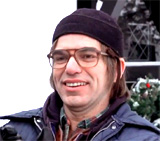
Older Slow-Witted Brother Jacob Mitchell (Billy Bob Thornton)
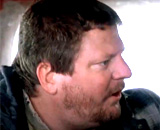
Jacob's Dissolute Friend Lou Chambers (Brent Briscoe)
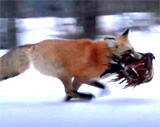
Crafty Fox With a Hen In Its Mouth Crossed Their Path
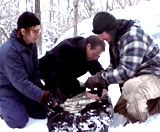
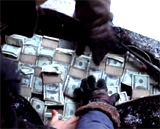
Their Discovery of a Black Duffel Gym-Bag Full of Money
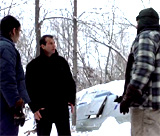
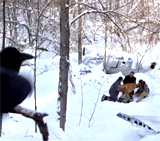
Hank Forcing Lou and Jacob to Agree to His Demands
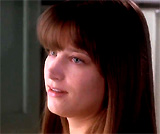
Upon Hank's Return Home, He Divulged to Sarah His "Secret" About
Finding About $4 Million of Lost Money
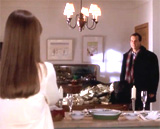
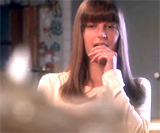
Revealing the Money to Sarah
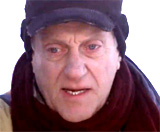
Farmer Dwight Stephanson (Tom Carey)
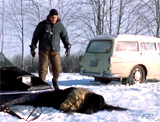
Dwight Stephanson Bludgeoned by Jacob
with Crowbar
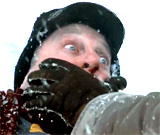
Hank Suffocating and Murdering the Revived Dwight
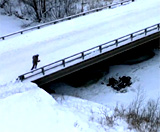
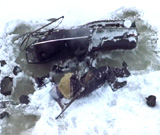
Hank Creating a Fake Snowmobile Accident Site
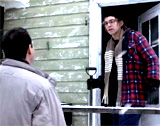
Jacob's Surprise Announcement to Hank About Rebuilding the Mitchell's
Family Farm
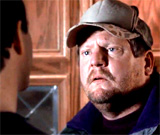
In the Middle of the Night, Drunken Lou Demanding from Hank Part of His
Share of the Money
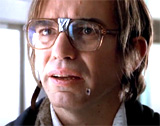
Jacob Asked to Affirm His Loyalty to his Brother Hank
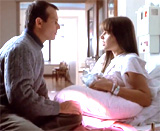
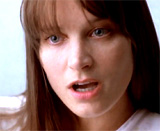
Sarah's Suggested Diabolical Plot For Hank - Frame Lou By Having Him
Drunkenly Confess to Dwight's Murder
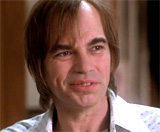
During Dinner, Jacob's Stunning Revelation to Hank That Their Father Purposely
Killed Himself - to Provide For the Family
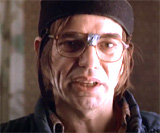
During Play-Acting, Jacob Suggested to Lou that Hank Would Rat Them Out
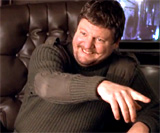
Drunken Lou Was Fooled Into Play-Acting, and Admitting That He Had Confessed
to the Sheriff That He Had Killed Dwight Stephanson
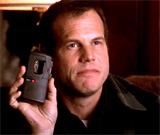
Hank Revealing the Incriminating Taped Recording to Lou
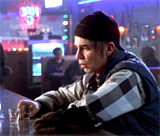
Jacob Morose After the Death of His Friend Lou
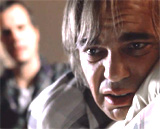
Jacob to Hank: "I feel evil"
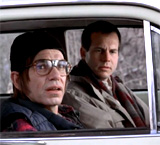
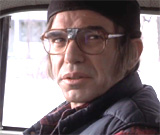
Jacob's Hope That the Money Would Solve All of His Loneliness Problems
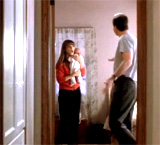
Sarah Reassuring Hank That He Shouldn't Be Frazzled ("You're just a normal guy...")
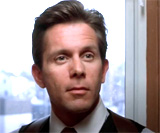
Inquisitive FBI Agent Neil Baxter (Gary Cole)
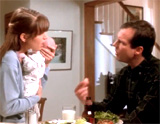
Sarah and Hank Arguing About How to Handle the Possibly Fake FBI Agent

Sarah to Hank: "I'm trying to come up with a plan..."
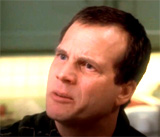
Hank: "A plan?...Is that the sort of plan you're thinking of?"
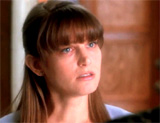
Sarah: "What about me?..You think that's gonna make me happy?"
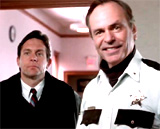
"FBI Agent" Baxter and the Sheriff About to Leave with Hank to Look
For a Missing Plane in the Woods
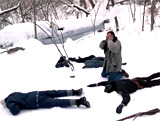
Hank Surrounded by Three Dead Bodies After Sacrificing Jacob
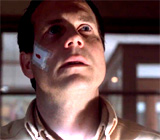
Hank Stunned to Learn From Two Real FBI Agents That About 10% of the Bills' Serial
Numbers Were Recorded - The Money Was Unusable
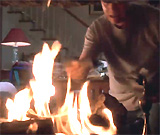
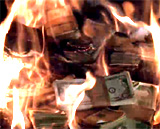
Hank Burning the Bills in His Fireplace
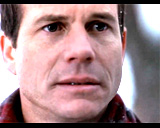
Hank With Deep Regrets
|













































